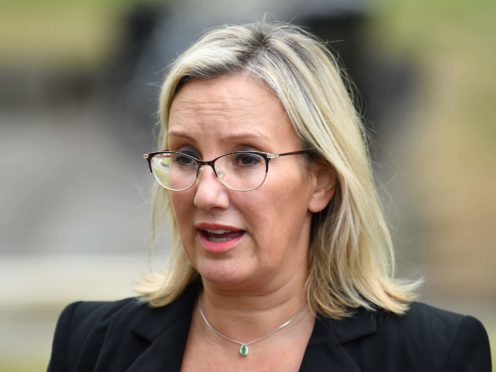The Government did not reject the European Union’s post-Brexit visa offer over an “ideological issue”, Culture Minister Caroline Dinenage has said.
Ms Dinenage told MPs they are “barking up the wrong tree” and that the UK took a “common-sense position” during negotiations.
She appeared in front of the Digital, Culture, Media and Sport Committee in a one-off session about the Government’s handling of talks with the EU over the issue.
The UK’s post-Brexit travel rules, which came into force at the beginning of the year, do not guarantee visa-free travel for musicians in the bloc and a working group featuring some 15 representatives of the creative industries has been set up to investigate.

Ms Dinenage told the committee: “I think you are barking up the wrong tree when you think this is some kind of ideological issue on behalf of the Home Office.
“I think the Home Office would have been very interested in the visa proposals that the EU were putting forward if they were firm guarantees, if they were actually binding, which they weren’t, if they actually delivered what we needed, if they didn’t ask in exchange for us to sign up to something that any other G7, any other big nation, has signed up for with the EU.
“It is not an ideological thing; it is a common-sense position.”
MPs also questioned Ms Dinenage over whether the Government and the EU had failed to reach an agreement on touring due to wider issues about immigration.
“I am not entirely sure it has become an issue about immigration,” she replied.
“I think it is an issue of trying to get the best opportunities for our creative workers to be able to tour overseas.
“It was never an issue about immigration other than the EU deal, which wouldn’t have delivered the things we were asking for, was in exchange for us signing up for something that no other G7 country would sign up to.
“I think it is too simple to say it is an immigration issue. I think that massively undermines the thrust of the discussion.”
Representing some 200,000+ petitioners, @CatMcKinnell Chair of @hocpetitions asks if UK Govt is still working to secure an EU-wide agreement? @cj_dinenage confirms no appetite for "complicated" EU-wide solution, greater success likelier negotiating with individual member states.
— Digital, Culture, Media and Sport Committee (@CommonsDCMS) February 16, 2021
Ms Dinenage said there is little “appetite” from the Government to renegotiate an EU-wide solution to the lack of touring visas.
Instead, she said agreements with individual member states are a “more likely success route”.
But asked whether any formal discussions with individual EU countries are taking place, she replied: “Not currently, not through DCMS.
“There may be some conversations happening through our colleagues in the FCDO (Foreign, Commonwealth and Development Office) but nothing formal or official.”
Ms Dinenage’s appearance in front of the committee came after a panel of representatives from across the creative industries warned that current travel arrangements threaten the sector.
Deborah Annetts, chief executive of the Incorporated Society of Musicians, said UK artists are already losing summer bookings due to the challenges of touring inside the EU.
However, she said the freeze on travel and live performances due to the Covid-19 pandemic offers a “window” in which to resolve the issue.
'The work permit situation is incredibly complicated and the ISM has put together a comprehensive 30-page guide which sets out all the work permit arrangements which differ from country to country. '@DeborahAnnetts https://t.co/3jyQ4tymN3
— ISM (@ISM_music) February 16, 2021
Ms Annetts told MPs: “Since we moved post-Brexit, so post the transition period, I think the adverse impact of Brexit to the creative industries and in particular the freelance community has become even more stark.
“I have been inundated with personal testimony from musicians as to the work that they have lost or are going to lose now in Europe as a result of the new visa and work permit arrangements.
“Some of them are really quite heart-rending, with musicians saying they are thinking of giving up being a musician altogether.”
She called on Ms Dinenage to “show leadership and put in place a visa waiver agreement”.
More than 280,000 people have signed a petition calling for a cultural work permit deal to be reached between the Government and EU.
Sir Ian McKellen, Sir Patrick Stewart and Dame Julie Walters were among more than 100 members of the Equity union who published an open letter on Tuesday urging Prime Minister Boris Johnson to secure visa-free EU travel for artists.
